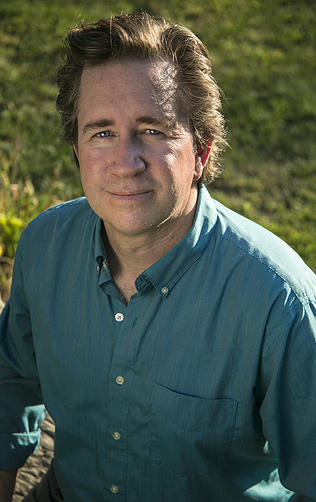 Photo by Marisa Ross.
Photo by Marisa Ross.
I’m excited to introduce my first guest blogger and accomplished writer, Patrick Ross, of Committed: A Memoir of the Artists Road. Patrick and I are fellow alums of the Vermont College of Fine Arts, where I had the opportunity to read parts of his powerful account of his journey across the United States to engage with creative individuals. But the book is more than about traveling; it’s about identity, and his journey of self-discovery. Starting on page one, Patrick bravely shares his vulnerabilities and demons. In this post, Patrick takes an honest look at what it means to live the life of an artist.
“Here’s a tip for artists who are in it for a lifetime. When the tide is in, write. Wake up at two in the morning if you have to and write. But if the tide is out don’t sweat it. That’s when you get your busywork done.” – Flutist and songwriter Steve “Voice of Golden Eagle” Cox, quoted in Committed: A Memoir of the Artist’s Road (p. 124).
Am I an artist who is in it for a lifetime? I’d like to think so. That was a theme of my travel memoir Committed. While on a cross-country trip interviewing artists of every type who had embraced an art-committed life, I found myself inspired to live the same way. It led me to earn an MFA in Writing and to write Committed. But just how committed am I to that life nearly five years after those interviews?
I interviewed Steve “Voice of Golden Eagle Cox” in Memphis, Tennessee. I thought of him at times as I spent the latter half of 2014 writing nothing more creative than short blog posts. No personal essays. No follow-up books. Nothing.
For a time I had a built-in excuse: Committed was published in October, so there was promotion leading up to its release, then more after its release. When promoting yourself as a writer, who has time to actually write? That frenzy of interviews, guest blogs, readings and book-signings largely came to an end. But still I didn’t write. The tide still wasn’t in.
Steve’s wisdom on the tide of creativity struck me the day he shared it with me, and so it was one of the small morsels from hundreds of hours of interviews that made it into Committed. But at the time I also sensed a lack of drive in Steve. He kept saying he was “open to possibility,” to write more music, to return to the road, to be creative.
I certainly didn’t see myself as superior to him in that scene, as my internal monologue suggests: “I am open right now to possibility in the same way a defeated prey is open to a predator’s jaws. It is an openness grounded in passivity (p. 124).” But as I progressed on my road trip, and became more open to possibility myself, I then found myself driven to seize that possibility.
Near the end of that road trip I interviewed another songwriter, radio DJ Rochelle Smith. Sitting in her Boise, Idaho, studio, she told me it had been a while since she had done any solo performing. “I guess I’m looking for that next project. I’m not sure what is coming, but I feel something is (p. 218).” She had earlier told me that she agreed to the interview because she had asked the universe if she should, and it had said yes. In Committed, I connect her in my mind with my Memphis interview:
“She’s presumably asked the universe and is waiting for an answer. I think again of Steve Cox, the Voice of Golden Eagle. He said the universe had proclaimed to him that a wondrous new path would be coming soon, and that he’d be ready when it arrived. But what if you don’t have the patience to wait? What if you’ve cleared your way through the tumbleweeds, the dried hulks of your past, and are anxious to drive forward (p. 218)?”
As I read this passage now I feel guilty, that I’m somehow suggesting that Steve and Rochelle now longer had any wisdom to offer me, that I’m ready to move forward and leave them with their passivity.
One of the most difficult aspects of writing Committed was telling the story as true as I could, including revealing the impressions that were being formed in me as I met with these artists who were so generous with their time and their stories. One reviewer of Committed, not surprisingly a professional writer, picked up on this:
“I was also grateful for the absence of gloss that might infect other essays on art. The artists Ross interviews in their own homes and studios are presented without makeup, so to speak. I could smell the cat litter, the coffee brewing in the kitchen, and the musty wardrobes. I saw dust bunnies beneath the sofa and front steps in need of repair. And so when Patrick was swept up in a sweeter aura that some artists exuded, I understood that here was an artist making a special impression upon the author (Amazon.com review by novelist P.J. Reece of Committed: A Memoir of the Artist’s Road).”
I have continued to grow since that 2010 trip. What I know now is that I was in no position to judge these two musicians for any perceived passivity. I’d add that both Steve and Rochelle were artists that made a special impression on me; that’s why they receive a disproportionate amount of attention in the book as I attempted to share their “sweeter aura” with my readers.
So this winter has proven to be a dry one creatively. There has been no tide because the water has frozen over. At times I have longed for even the hint of possibility, the notion that perhaps the universe had something waiting for me. On far too many days the story of my art-committed life seemed written in the past tense.
You can’t force the tide to come in. But you can be ready for it when it arrives. And in the last three weeks or so, some cracks have formed in the ice. A bit of cold water has stealthily streamed onto shore. I’ve seized on those drops, writing a few pages of choppy, rough prose for my next book. I’m refusing to judge its quality right now, but instead just reveling in the fact that I am, apparently, still a creative writer living an art-committed life.
There is much defrosting still to do. This winter has been the most brutal for me emotionally in nearly a decade. But I understand that Steve “Voice of Golden Eagle” Cox was not just wise in understanding that creativity is a tide, but that we have to remain open to possibility. You can’t seize something that isn’t there, but you can be ready for it when it arrives.
Patrick Ross is a professional storyteller. He works by day as a speechwriter and communications advisor in the Obama Administration while finding time to teach creative writing online with The Loft Literary Center. The author of Committed: A Memoir of the Artist’s Road, he has an MFA in Writing from the Vermont College of Fine Arts. Learn more at http://www.patrick-ross.com.
Read More





 Photo by Marisa Ross.
Photo by Marisa Ross.

Recent Comments